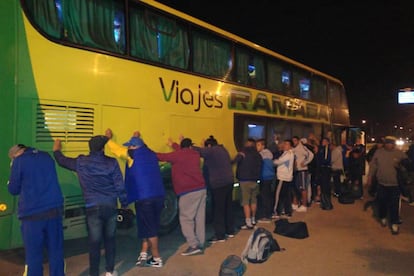Why is watching soccer so dangerous in Argentina?
Deaths, injuries, poor safety and ageing stadiums all make the beautiful game a high-risk sport
Last month a 22-year-old soccer fan in Argentina accused by supporters of top side Belgrano of being a fan of arch rivals Talleres was beaten and then thrown from a stand to the terraces below at a match in Belgrano’s stadium in the city of Córdoba, in the interior of the country.

The young man later died of his injuries and the killing was shown on television and social media, prompting an outcry. In response, the government of President Mauricio Macri has since issued a decree with measures aimed at curbing the violence long endemic to the game.
The measures allow the state to ban fans from attending matches who have been convicted or are awaiting trial for involvement in violence at soccer stadiums in Argentina or abroad.
At the same time, tougher restrictions will be applied to ticket sales to prevent touting, one of the many criminal activities in which hardcore fans, known as barras, are involved. Under-16s will no longer be able to enter grounds unless accompanied by an adul, and away fans will also be banned from matches.
We are killing each other all the time: at a soccer match or waiting for the traffic light to change Damián Pussetto
Damián Pussetto was the coordinator of the now-defunct Sub-secretariat of Soccer Safety between 2003 and 2007, and is also a lifelong fan of leading team Independiente. Asked about the ban on visiting fans, he says: “That was a recognition that neither the authorities are able to provide security; that the stadiums are not fit for purpose; and that people do not relate to the sport in a normal way.” He adds: “No measure on its own will provide results in such a complex area. By issuing the ban, the state was saying it didn’t want to get involved in every fight in every match. Today, the situation is worse. There was the mere presumption that somebody was from a rival team, and the ordinary fans – not the barras – killed him. We are a society that is killing each other all the time. At a soccer match or waiting for the traffic light to change.”
Natalia Romero, aged 42, has been a Racing fan since 1992. She agrees with the ban on visiting supporters. “When they introduced it I disagreed because it was nice to chant things at the rival and for them to chant back.”
Juan Valentín Palacio, a Boca fan, disagrees: “It hasn’t achieved the objective. It changed nothing, and to be honest, for me it created more problems than solutions, particularly in terms of the money that the smaller teams used to receive.”
The authorities have been turning a blind eye to the problem for many years
Racing’s hard-core barra fans have been targeted by police following a number of incidents. Natalia Romero says that she has never felt unsafe attending games. “It is safe, although you have to take care of yourself. On Saturday, right in front of me, as I was leaving a game, they caught three barras. I was able to avoid the incident, but it was tense. It could be that I never have problems because Racing is a family-oriented ground and has always welcomed women.”
The activities of the barras are not limited to match days. Last week, players at Atlanta, a third-division side, were training when a group of fans turned up demanding the equivalent of $6,400 in compensation for their side’s recent poor performance.
At the same time, the barras are active on social networks, which they use to organize fights at matches, which in turn are a source of income from drug dealing, theft and influence peddling. They often take a cut from gangs who charge visiting spectators for “looking after” their car outside the stadium.
The authorities have been turning a blind eye to the barras’ activities for many years, as have the clubs themselves. Overcoming this inertia will be one of the main challenges for the government and the Argentinean Football Association as they attempt to crack down on violence at the country’s soccer stadiums.
English version by Nick Lyne.
Tu suscripción se está usando en otro dispositivo
¿Quieres añadir otro usuario a tu suscripción?
Si continúas leyendo en este dispositivo, no se podrá leer en el otro.
FlechaTu suscripción se está usando en otro dispositivo y solo puedes acceder a EL PAÍS desde un dispositivo a la vez.
Si quieres compartir tu cuenta, cambia tu suscripción a la modalidad Premium, así podrás añadir otro usuario. Cada uno accederá con su propia cuenta de email, lo que os permitirá personalizar vuestra experiencia en EL PAÍS.
En el caso de no saber quién está usando tu cuenta, te recomendamos cambiar tu contraseña aquí.
Si decides continuar compartiendo tu cuenta, este mensaje se mostrará en tu dispositivo y en el de la otra persona que está usando tu cuenta de forma indefinida, afectando a tu experiencia de lectura. Puedes consultar aquí los términos y condiciones de la suscripción digital.










































